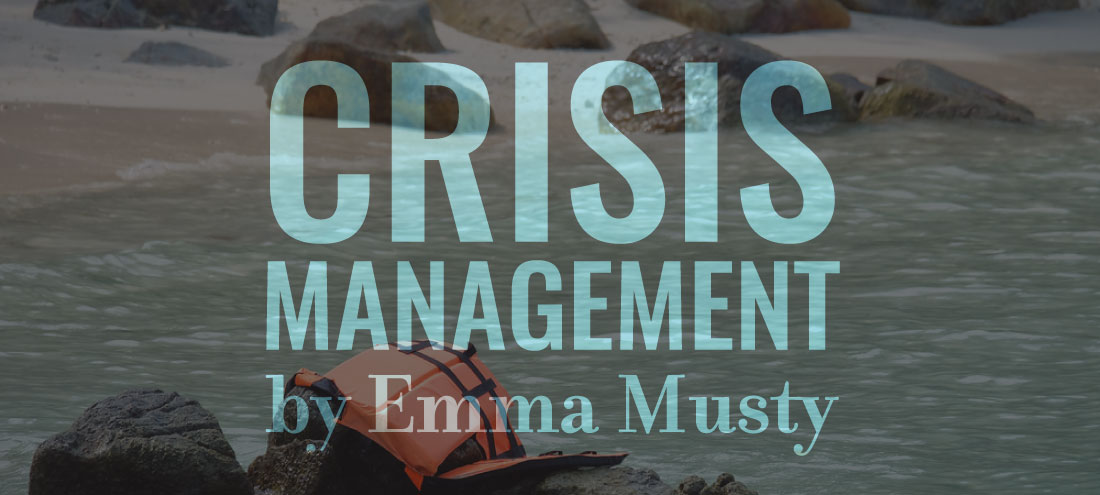by Emma Musty
2nd Place – Flash 405, August 2017: “Blue”
Nonfiction

It is a stark contrast, the orange with the blue. Bits of old boat, torn life jackets, fishing nets and a doll with florescent hair float below me. From where I’m crouched on the rocks I can just make out the opposite shore of Turkey. The sea is so big that even something as enormous as a human life can get lost in it.
A friend has just called to ask if I’m having a mental breakdown and I have come here to work out the answer.
I work in a refugee camp cooking soup for new arrivals and people trapped here longer term. I live in a shared house with eight other volunteers, one cat and one dog. Every day I go to the kitchen. Once a week or so a boat goes down off the coast of Lesvos and we nod at the news, knowing that if those people had survived they would have eaten our soup, but now that those people are dead, they won’t. It’s a strange thing to know.
I arrived to Lesvos by ferry. It cost me €60.
On a daily basis we concentrate on simple activities—warehouse runs and food prep; we work out numbers, calculate supplies, bargain, beg, borrow, and make-do. When the veg runs out we make packet noodle soup because at least it’s hot. We turn Nutella into hot chocolate while elsewhere in the camp other volunteers turn used life vests into mattresses.
I look down at my chocolate stained fingers, shift my feet to ease the pain in my back, and look back out to sea. There have definitely been moments when I’ve lost it. Take the time I tried to visit my boyfriend in Italy and discovered that the cheapest route was via Turkey, that I could take a boat there for just €10. Forty people had died trying to make that same crossing the day before. I had crouched down behind the kitchen tent and cried, feeling as if I would never stop.
The wind is picking up; if it gets much worse there are unlikely to be any new arrivals today, but there is still cooking to be done. Before I stand to leave I plunge my hand into the water and hold it there. It is cold and I bring the water to my face. The salt stings and my body aches but I am perfectly sane.
Judge’s Comments:
“Crisis Management” is a strong piece on a timely topic. But while it’s about refugees and their continual plight, it’s also about the main character coming to terms with his/her own sense of “rescue”—in a sense, saving others and oneself, amid much uncertainty. Here, “Blue” relates to the sea that is a means of escape but also an agent in potential disaster and loss of life. We love the imagery and detail, like “bits of old boat, torn life jackets,” and the descriptions and inner-workings of a person living and surviving in a refugee camp. It all tells a story that feels very in-depth and fulfilling while still quite short in length. Also, we were taken by and commend the contrasts in writing style from practical to poetic: “The sea is so big that even something as enormous as a human life can get lost in it” and “When the veg runs out we make packet noodle soup because at least it’s hot.” Bravo.
Emma Musty is a writer, activist and academic with ten years worth of teaching experience in both academic and community settings. She was awarded her PhD in Creative Writing from Aberystwyth University in July 2016. The novel she wrote during her PhD, A Short History of Lines, is currently out with agents. Her work has appeared widely both in print and online in publications including Aesthetica and Cheval 5, published by Parthian. Both of her novels were longlisted in the Mslexia Novel Prize 2014. In 2015 she completed two publishing internships with Honno Press and The New Welsh Review. She is currently working on a new novel, The Bare Bones of Now, and writing her first album. Her work picks apart the borders we live between and that live within us. This exploration has led her to investigate the novel as a map. Maps, in whatever form—oral, written, or drawn—allow us to place ourselves culturally as well as geographically. They allow us to consider where we belong and to whom. Recently she has expanded this journey into creative nonfiction. In 2016 she moved to Athens having co-founded a co-operative social centre, Khora (www.khora-athens.org), for the refugee community in the city.